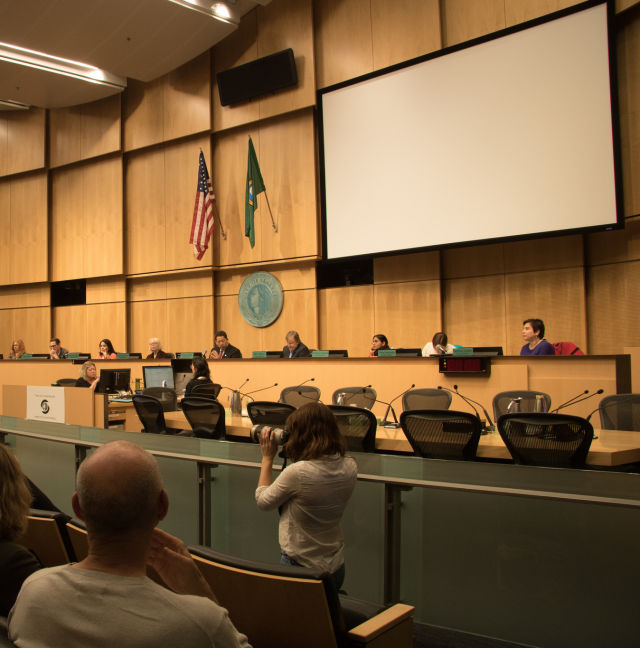Seattle City Council Passes $5.9 Billion Budget

Seattle city council members on Monday in an 8-1 vote approved a $5.9 billion 2019 budget that focused on sustaining basic city services, and left little room for boosted spending on homelessness.
The budget session this year faced few major changes and muted energy from the public, with just a handful of speakers who appeared for the public hearing Monday.
The amendments council members did include were carefully selected to speak to their set of values—like Lorena Gonzalez's maintaining funding for the city's $1 million immigrant legal defense fund—or district advocacy for November 2019. Seven council seats will be up for election next year.
Sally Bagshaw, chair of the select budget committee, said that while the city continued to expand some funding, particularly in mental health outreach, "in no way do we have the ample resources that we need to make that big jump" to fully address the city's pressing needs. She, along with other council members, again emphasized wanting a regional effort to the homelessness crisis.
Mayor Jenny Durkan's proposal took a conservative approach to balancing the budget this year—and with no new revenue, and the head tax repeal still a fresh wound for elected officials, council members' had limited options for changes. The 2019 budget is just slightly larger than this year's $5.5 billion.
Last-minute changes included an amendment sponsored by Teresa Mosqueda to add $1.8 million in the biennial budget—$900,000 each year—for 2 percent wage increases for all contract homeless service providers.
David Helde, a housing assistance case manager, has been working at the Downtown Emergency Service Center for three and a half years. He said he's the only one left of the case managers who worked there when he started.
Service providers attribute the high turnover to the low wages and the stress, leaving longterm clients in the system to adjust to a revolving door of new case managers.
"The cost of ongoing loss of trust and the shift in familiar faces for our clients is an even bigger price tag," said Jody Waits, development and communications offer at YouthCare. "At the end of the day, this hurts progress for all of us."
But Mosqueda and Mike O'Brien, who co-sponsored the green sheet and has advocated for service providers' wage increases in the past, acknowledged the 2 percent raise does little to address the problem.
O'Brien said it's a first step to try and normalize wage increases for service providers, and elected officials say they're signaling their commitment to continue to improve on it.
"We have taken a tremendous stride today, but it’s really a down payment in making sure we’re addressing the rising cost," Mosqueda said. "This is a problem that the mayor and the city council have inherited. Today we are beginning to address this."
City council members found the funding for both the contract workers and the Navigation Team, a group of specialized outreach workers to connect homeless people with critical services, using money from a business-and-occupation tax exemption that expired in 2017.
Wage increases for service providers are just one of the ways the city council members tried to get the ball rolling on small but specific changes.
Affordable child care was another issue newly elected Mosqueda had promised to tackle during her campaign; the council is starting with $100,000 to spend on plans for a child care center at City Hall for city employees.
“Now our hard work continues," Durkan said in a statement Monday. "Using this budget as our guide, we must continue to be stewards of taxpayer dollars and invest in a more affordable, inclusive and vibrant future for all who call Seattle home.”




